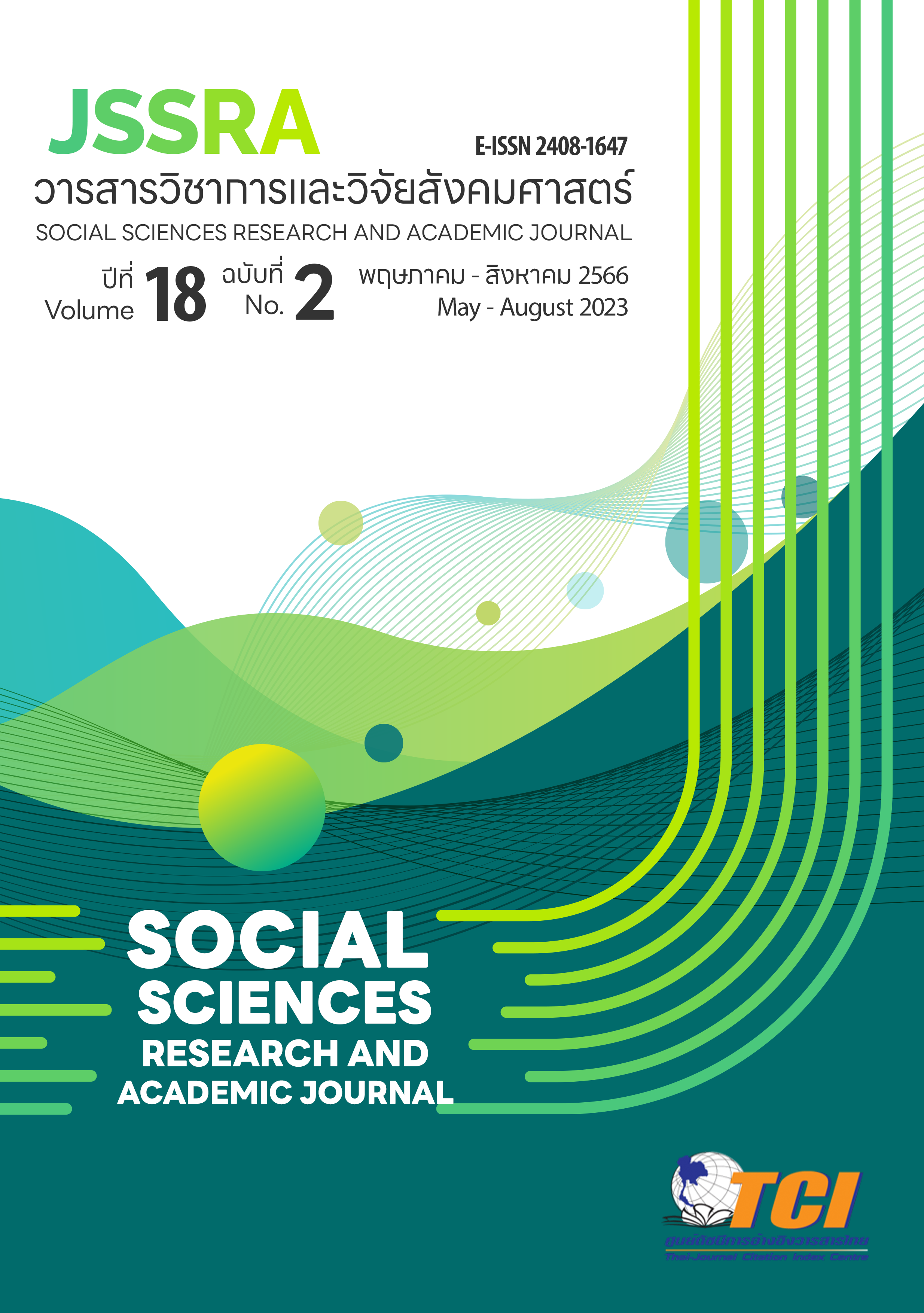ผลการจัดการเรียนรู้ตามแนวทางสะเต็มศึกษา เพื่อส่งเสริมจิตนิสัยทางสะเต็ม Effcet of Learning the Stem Education to Enhance the Stem Habits of Mind
Main Article Content
Abstract
This research focused on STEM teaching in Thermal energy and state of matter, Eco-lodge and Water treatment contents for enhances STEM habits of mind and characteristic STEM habits of mind with learning achievement in grade 7 students. The sample in this research were 29 student in grade 7 at Muangtalungpittayasan School. Four types of research instruments were (1) experimental tools: three STEM Education lesson plans for enhance STEM habits of mind; (2) evaluation tools: the STEM habits of mind evaluation form, achievement test and an interview assessment form. Descriptive statistics are used to describe a variables for a sample of data, the mean, standard deviation, a t-test for dependent sample and ANOVA. The non-numeric information were analyzed by content analysis.
The results indicate that:
- After the programs, the learning achievement was significantly improved at a level of .05
- This programs was able to enhance STEM habits of mind. The results showed that the STEM habits of mind in student were higher than average. The results showed that content analysis of learning activity transcribed and interviewed revealed that the STEM habits of mind includes six aspect, 1) Curiosity 2) Carefully Making decision 3) Integrative thinking 4) Recognizing cause and effect 5) Communicative ability and 6) Innovative ability.
Article Details
References
กระทรวงศึกษาธิการ. (2559). คณะกรรมการนโยบายการจัดการเรียนการสอนสะเต็มศึกษาในlถานศึกษา.สืบค้นเมื่อ 31 สิงหาคม 2559, จาก https://www.moe.go.th
จารีพร ผลมูล, สุนีย์ เหมะประสิทธิ์, และเกริก ศักดิ์สุภาพ. (2558, พฤษภาคม-สิงหาคม). การพัฒนาหน่วยการเรียนรู้บูรณาการแบบ STEAM สำหรับนักเรียนชั้น มัธยมศึกษาปีที่ 3 : กรณีศึกษา ชุมชนวังตะกอ จังหวัด ชุมพร. วารสารวิจัย มข. มส. (บศ.), 3(2), 1-13.
น้ำฝน คูเจริญไพศาล, รังสิยา ขวัญเมือง, และลลิตา มาเอี่ยม. (2562, มกราคม-มิถุนายน). การพัฒนาชุดกิจกรรมวิทยาศาสตร์ตามแนวทาง สะเต็มศึกษา (STEM EDUCATION) เรื่อง การปรับปรุงคุณภาพน้ำสำหรับนักเรียนระดับมัธยมศึกษาตอนต้น. วารสารศรีนครินทรวิโรฒวิจัยและพัฒนา (สาขามนุษยศาสตร์และสังคมศาสตร์), 11 (21), 23-38.
พรทิพย์ ศิริภัทราชัย. (2556, เมษายน-มิถุนายน). STEM Education กับการพัฒนาทักษะในศตวรรษที่ 21. วารสารนักบริหาร, 33(2), 49-56.
มนตรี จุฬาวัฒนฑล. (2556, พฤศจิกายน-ธันวาคม).สะเต็มศึกษาประเทศไทยและฑูตสะเต็ม. วารสารสสวท, 42(185), 8-9.
รังสิยา ขวัญเมือง, และลลิตา มาเอี่ยม. (2559). ผลการใช้ชุดกิจกรรมวิทยาศาสตร์ เรื่อง การปรับปรุงคุณภาพน้ำตามแนวทางสะเต็มศึกษา สำหรับนักเรียนระดับชั้นมัธยมศึกษาตอนต้น. การค้นคว้าอิสระการศึกษาบัณฑิต คณะวิทยาศาสตร์ มหาวิทยาลัยศรีนครินทรวิโรฒ, กรุงเทพฯ.
ศิริลักษณ์ ชาวลุ่มบัว. (2558). การพัฒนาหลักสูตรตามแนวทางสะเต็มศึกษา เรื่อง อ้อย สำหรับนักเรียนชั้นมัธยมศึกษาปีที่ 3. ปริญญานิพนธ์ กศ.ด. (วิทยาศาสตรศึกษา). มหาวิทยาลัยศรีนครินทรวิโรฒ, กรุงเทพฯ.
สุชานาฏ สุวรรณพิบูลย์. (2559). การพัฒนาหน่วยการเรียนรู้แบบบูรณาการ เรื่อง บ้านพักเชิงนิเวศตามแนวทางสะเต็มศึกษา สำหรับชั้นมัธยมศึกษาปีที่ 1. ปริญญานิพนธ์ ศ.ม. (วิทยาการทางการศึกษาและการจัดการเรียนรู้). มหาวิทยาลัยศรีนครินทรวิโรฒ, กรุงเทพฯ.
สุพรรณี ชาญประเสริฐ. (2556, พฤศจิกายน-ธันวาคม).การจัดการเรียนรู้วิทยาศาสตร์และทักษะที่จำเป็นในศตวรรษที่ 21. วารสารสสวท. 42(185), 3.
อนงค์นาฎ ครุณรัมย์, พินิจ ขำวงษ์, มนัส บุญประกอบ และธีรวัฒน์ ประกอบผล. (2561, กรกฎาคม-ธันวาคม). การสังเคราะห์ความหมายและองค์ประกอบของจิตนิสัยทางสะเต็ม. วารสารวิชาการเครือข่ายบัณฑิตศึกษามหาวิทยาลัยราชภัฎภาคเหนือ. 8(15), 63-76.
Costa, A.L. (2008). Describing the Habits of Mind. In Learning and Leading with Habits of Mind. Costa, A.L.; & Kallick, B. pp. 15-38. USA: ASCD
Gonzalez, H. B.; & Kuenzi, J. J. (2012). Science, Technology, Engineering, and Mathematics (STEM) Education: A Primer. Retrieved June 10, 2014, from, www.fas.org/sgp/crs/misc/R42642.pdf
Labov, J. B.; Reid, A. H.; & Yamamoto, K. R. (2010, March). Integrated Biology and Undergraduate Science Education: a new biology education for the 21st century?. CBE Life Science Education. 9(1), 10-16.
Tishman, S. (2000). Why Teach Habits of Mind?. In Discovering & Exploring Habits of Mind. Costa, A.L.; & Kallick, B. pp. 41-51. USA: ASCD.


